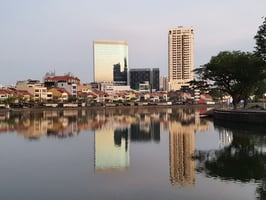The Financial Times reported last week that Singapore’s Prime Minister, Lee Hsien Loong, has...
Singapore's World-Class Education Is A Key Differentiator
Is the quality of a country’s engineering workforce a key concern for your outsourcing? If so, you must consider Singapore. The government here has always been laser-focused on building its competitiveness and education is one of the key assets in its arsenal. As a result, Singapore's world-class education ranks as one of best among top nations.
Strong Foundation in English, Mathematics and the Sciences
Singapore consistently ranks among the best in the Program for International Student Assessment (Pisa) -- a worldwide study conducted by the OECD to assess the performance of 15-year-olds in mathematics, science and reading. This is a testament to Singapore’s effectiveness in teaching mathematics and the sciences, both of which provides students a strong foundation should they choose to go into engineering.
But that’s not all. A key differentiator that sets Singapore apart from other Pisa top-performers like China, Macau and Hong Kong is its people’s proficiency in English. English has been the main language of instruction since 1987. In fact, in recent years, English has overtaken other languages as the language most commonly spoken at home. Communication with a Singaporean worker will not be a problem.
Educating a Globally-Competent Workforce
Internationalization is another mainstay of Singapore’s education.
In school, students learn about how Singapore’s role as a seaport and trade hub has contributed to its prosperity, stretching back centuries. Through the Social Studies curriculum, students are taught about other societies with traits similar to Singapore's -- small, multicultural, trade-dependent -- and the lessons Singapore can learn from them.
The government also emphasizes exposure to other cultures from an early age. Many school children regularly participate in overseas school trips, where they get to interact with students their age in a foreign country.
Meanwhile, about half of all students at local institutes of higher learning (IHLs) have gone on overseas stints like internships, student exchange programs and study trips. This figure is set to rise. In the most recent Singapore Budget 2020, Deputy Prime Minister Heng Swee Keat announced a new target of having 70 percent of these students gain overseas exposure. This is so that more will be equipped with cross-cultural skills and awareness of the region.
Essentially, you’ll be dealing with an internationalized, globally-competent workers that are no strangers to working in a multicultural setting.
Top Tier I Higher Learning Institutions
In the latest Quacquarelli Symonds (QS) World University Rankings released in 2019, the National University of Singapore (NUS) ranked 8th in the Engineering and Technology category.
In terms of the overall world ranking, the NUS and another Singapore university -- the Nanyang Technological University (NTU) -- tied for the 11th spot. That’s just one spot below the University of Chicago.
In addition to its world-class universities, Singapore also has polytechnics and vocational schools (called Institute of Technical Education or ITE) offering industry-oriented training at the post-secondary level. Polytechnics offer 3-year diploma courses in specialized and targeted areas, such as Advanced and Digital Manufacturing, Automation and Mechatronics Systems, Clean Energy, etc. On the other hand, ITEs offer training, apprenticeship, and skills certification for skilled technicians and workers.
Keeping Up with Changing Industry Needs
Do you worry that workers have outdated skills and are not trained for newly-emerged competencies? Singapore has that covered, too.
Singapore is big on Continuing Education and Training (CET).
Besides generous ongoing funding to encourage employers to train their workers, in 2015, the government also gave a S$500 Skills Future credit to all Singaporeans aged 25 and above. This is to incentivize the workforce to reskill, upskill, and prepare themselves to seize opportunities in up-and-coming fields. Another S$500 addition is slated for October 2020.
To bridge the gap between education and industry needs, Singapore has in recent years looked towards emulating countries like Germany, which has found success through collaboration between industry and schools. This led to the introduction of the Earn-and-Learn Program -- a structured on-the-job training program that allows fresh graduates to work while earning their Post-Diploma. In 2020, this program is being expanded to the University level, with the Singapore Institute of Technology (SIT) introducing an Industrial Doctorate Program and an Industrial Master Program.
Always Seeking to Improve
Having set and achieved a high target for its education system, Singapore is constantly looking for ways to help its workers bring more value to the table.
Singapore's world-class education, with its focus on the sciences, coupled with proficiency in English and emphasis on global competency, makes their workforce the ideal human capital to support your outsourced business.
If you would like to know more about how bringing your business to Singapore can help you, contact us here: https://kusucorp.com/contact

-1.jpg?width=146&height=50&name=Kusu%20(1)-1.jpg)



